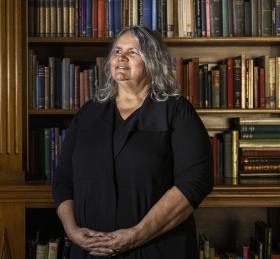Self-portrait: Debra Dank

I hadn’t ever thought I would write stories to contribute to the Australian canon. I certainly imagined a time when this writing would be done by Aboriginal people who just needed those stories to be told — but not for our sake. I knew it had to be us because we were the ones who had lived these stories. We had that big history of listening–hearing with this Country. Since the arrival of Cook, the listening–hearing has been lost in a consistent and systematic process of brutality inflicted on people and on Country.
As a child of the 1960s I read constantly, and remember reading those then-recent Australian books and writings that positioned Aboriginal people in ways I did not recognise. I think I was already aware, thanks to the attendance of my parents, that this was not who we were.
Despite dispossession and too many other horrific events since the arrival of Cook, we had the privilege of knowing our mob through narrative, practised since the Dreaming, a time that Western research suggests was about 65,000 years ago. It is such an easy thing to imagine and reframe the relationship between Aboriginal Australians and Country through concepts of linear time, all neatly encompassed in five numerals — 6 5 0 0 0. Of course, our relationship was not ever easy, but the significant danger within that quick, casual number is the intimation that only by some happy accident of fate, despite nomadic walkabouts, did we achieve that longevity. That number, in its almost tossed-off awareness, ignores the significant work of making and maintaining relationships with Country.
Growing up in remote places was a gift. I sometimes wonder what I’d change if I had the opportunity to live that life again, and the answer is always the same: I would listen better, and I would work harder at hearing. I would listen better than I knew I needed to back then, in the hope of hearing more stories of living sustainably in relation with Country. I have come to realise that the act of listening–hearing is integral to being a considerate co-occupant, a respectful guest, and an active protector of futures in this geographic place that, for the short moment of our life span, offers us hospitality.
There are many stories told of this place and its evolution into what it is now. But too many of those stories are not the stories that tell us, Aboriginal or other Australians, about our place in this newer country. I saw my parents and other Aboriginal people work hard with little reward, and even less recognition. My mob was not named in the photographs, nor were their contributions to what has become contemporary Australia recorded and celebrated. The efforts of Aboriginal Australians in protecting our place — of Aboriginal men who saved and guided the explorers, of Aboriginal women who were literally wet nurses to our new Australians, of people who worked in the industries that established this new-look country — all failed to be represented in the national discourse. That lack of representation perpetuates the notion of terra nullius in a most insidious manner.
Terra nullius was overturned in 1992, with the Mabo decision. Despite that important moment in the newer history of this country, our concern was around the continued and seemingly unchallengeable claiming of this place by and for the British Crown. In that moment, we Australians lost an opportunity to have a better conversation. It required our ability and willingness to suspend ideas of ownership and rights. It needed us to be listening–hearing. It was, I think, a good opportunity to reflect on the illogical imagining that positioned Aboriginal people as nomadic people indulging in simple, inadvertent walkabout. Done, no less, by people who had genuinely participated in nomadic walkabout and wandered from one side of the world to arrive here.
Positioning human bodies as guests on Country, with responsibilities to our non-human kin, and living in ways that require relationships saturated with reciprocity and obligation, have allowed Aboriginal Australians to survive well since the Dreaming–65,000 years. Terra nullius failed to recognise the deep-thinking processes through which Aboriginal communities have lived — and continue to live — sustainably, and it indulged the race to consume the natural resources of our place at an unimaginable rate.
It saddens me deeply to imagine what our children’s children, and their children, will say of our excesses. None of it will be good and their blame will be justified.
Debra Dank is a Gudanji/Wakaja woman. Her book, We Come With This Place, published by Echo, won four awards at the 2023 NSW Premier’s Literary Awards, including Book of the Year, and was shortlisted for the 2023 Stella Prize and won the 2023 ALS Gold Medal.
This story appears in Openbook spring 2023.